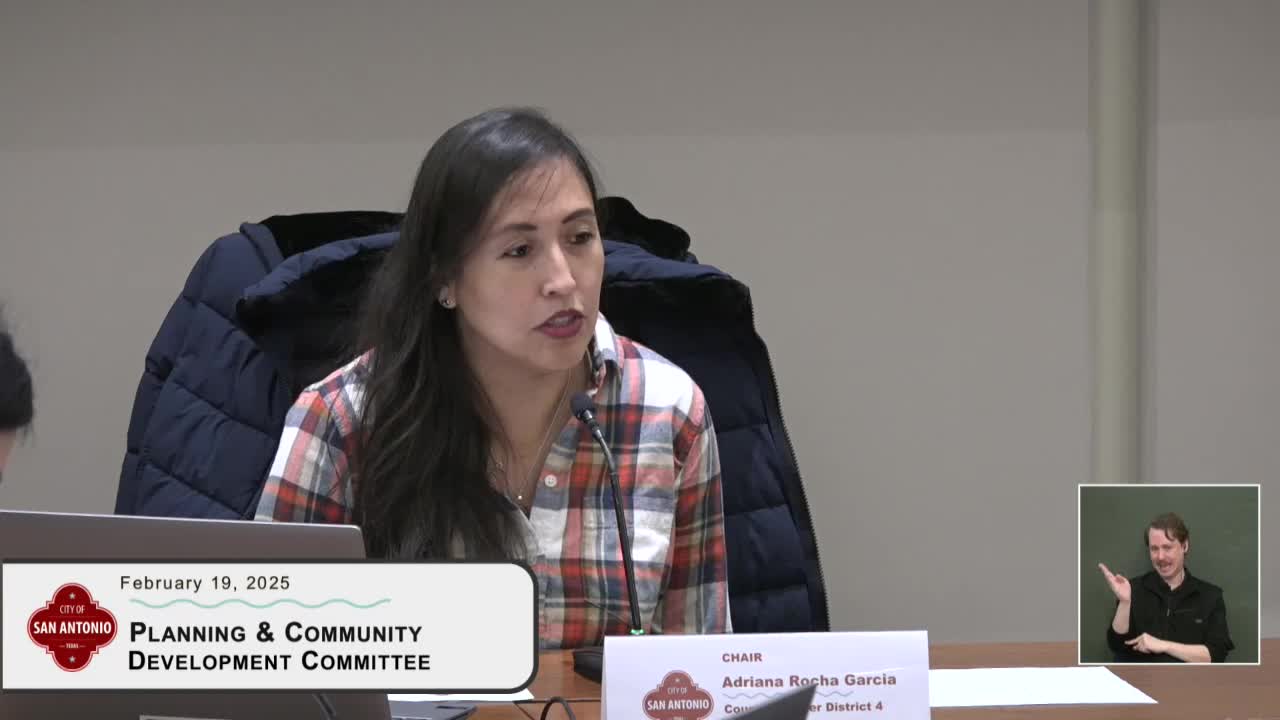San Antonio committee reviews metal-recycling task force after safety and representation concerns
Get AI-powered insights, summaries, and transcripts
Subscribe
Summary
The San Antonio Committee on Development and Planning on Feb. 19 heard public comment and a staff update on a task force reviewing municipal code provisions for metal recyclers and used auto parts, after residents and industry representatives raised concerns about fires, hazardous materials and the committee’s membership balance.
The San Antonio Committee on Development and Planning on Feb. 19 heard public comment and a staff update on a task force reviewing municipal code provisions for metal recyclers and used auto parts, after residents and industry representatives raised concerns about fires, hazardous materials and the committee’s membership balance.
The update, given by Mike Shannon, director of Development Services, outlined the task force’s work to revise the city code (referred to in committee as “Chapter 16” regarding recycling and used-auto-parts operations), described attendance and representation problems on the workgroup, and set a target timeline for returning recommendations in the spring.
Why it matters: code changes could alter zoning protections, hazardous-material definitions and enforcement tools that affect neighborhoods near recycling yards. Public-safety alarms at recycling facilities and perceived imbalance between industry and community representatives have framed the debate.
Public commenters pressed for stronger community input and clearer safety language. “Es muy agradable ser invitada, pero los obstáculos que hemos tenido, las horas no son no son competentes con la comunidad,” said Débora Ponce, a District 4 representative on the metal-recycling workforce group, citing scheduling obstacles that she said caused community participants to leave the task force. Ponce asked that community members have meaningful opportunities to sit at the table and that the workgroup’s hours and processes be fixed.
Attorney John Paul, who identified himself as representing a metal-recycling organization in San Antonio, urged the committee to preserve existing zoning protections and to adopt clearer definitions for hazardous materials. “Hemos tenido muchas alarmas de incendios y explosiones en nuestras instalaciones que son drásticos,” Paul said, adding that the CCR (a council consideration request by Councilmember Castillo) and related revisions should include environmental expertise and clear prevention mechanisms.
Several speakers, including Shananne Rohl (a District 5 representative to the workforce group) and Lina Colorado, said the workgroup has been unbalanced in attendance and voting power between industry and community members. Rohl said members with possible conflicts of interest were not always explained to the group, and urged transparency and stricter review of participants’ qualifications.
Mike Shannon described the city’s approach and the problems it has encountered. According to Shannon, staff originally sought up to 10 industry representatives and up to 10 community members from the districts near recycling operations; after outreach the city selected eight workgroup members from applicants. Shannon said the overall process began in September and that staff has held multiple meetings: he described both ‘‘ten meetings’’ of the broader process and multiple subcommittee sessions for the workforce groups. He also said staff plans to begin new designations in March, to consider different meeting days and times (including evening hours), and to aim for a framework of recommendations to return to the council in April.
Committee members and staff discussed procedural fixes: recording meetings (rather than relying solely on live streaming), allowing alternates for members who serve on multiple boards, convening subcommittees within two weeks to move the process forward, and providing attendance reports. Councilmember Villagrán, Councilmember Castillo (District 5), Councilmember Peláez and Council President Rocha García all spoke in favor of finding scheduling and membership solutions so the task force can reach balanced recommendations.
Speakers also raised regulatory coordination concerns. A committee member noted the Texas Commission on Environmental Quality (TCEQ) handles air and water monitoring and suggested the city might coordinate with that agency on technical matters related to hazardous materials.
Formal action taken at the start of the meeting: the committee approved the minutes of its Feb. 7 meeting. The approval was announced as passed; no roll-call tally or mover/second was recorded in the transcript.
What’s next: staff said it will meet with Councilmembers Castillo and Villagrán and other subcommittee members to identify new designees, explore alternative meeting times and consider recording options; the stated target was to reconvene workgroup designations in March and to return recommendations by April. The committee adjourned at about 10:55 a.m.
